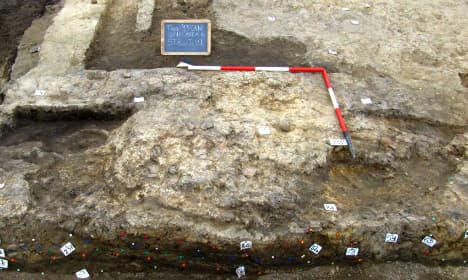Bronze Age village found near ancient Roman city

A 3,500-year-old settlement has been unearthed near an ancient Roman city in northeast Italy.
The Roman city of Aquileia, in Friuli Venezia Giulia, is one of Italy's 51 world heritage sites but the discovery of a Bronze Age village just outside the city has cast new light on the area's human history, Corriere della Sera reported.
The village was found next to an ancient Roman canal, known as the Canale Anfora, by a team of archaeologists from the University of Udine.
From 200BC until 400AD Aquileia – today home to just 3,500 inhabitants – was one of the biggest and most important market towns in Europe, with a population of some 100,000.
Much is known about the town's Roman origins, which now stretch back even further.
Archaeologists were first alerted to the possible existence of an earlier "protosettlement" after carrying out a geophysical scan in 1980, but had to wait until 2013 before excavations could get underway.
The excavations, which concluded in December, have revealed the remains of a Bronze Age village which had area of 100,000 square metres.
Among the findings were the foundations of several buildings made from gravel and stone - once the walls of Bronze Age homes.
The digs also unearthed a series of open hearths, which were used for cooking and manufacturing goods.
Numerous fragments of pottery and other household items such as rudimentary spindles we also found.
“The objects provide important information about the villagers' lifestyle and reveal much about ways in which people came together,” Elisabetta Borgna, who led the excavation, told Corriere.
Based on the artefacts found at the site, experts say the settlement existed for some 300 years between 1500BC and 1200BC, during which time it is thought to have been a key trading point - much like the later Roman town on Aquileia – which followed it.
“We think that during the middle Bronze Age the villagers got together with other groups from nearby settlements on convivial occasions, when trade would take place,” Borgna said.
The discovery represents another tantalizing challenge for archaeologists in the region, who have until now only excavated a fraction of the ancient Aquileia.
Research has now moved out of the field and into the laboratories at the University of Udine, where fragments of organic matter found at the site are being analyzed to try to discover how the villagers ate.
The numerous samples of pottery are also being analyzed and accurately dated in a bid to reveal more information about the cultural exchanges which were taking place, 1,000 years before the Roman colony was founded.
Comments
See Also
The Roman city of Aquileia, in Friuli Venezia Giulia, is one of Italy's 51 world heritage sites but the discovery of a Bronze Age village just outside the city has cast new light on the area's human history, Corriere della Sera reported.
The village was found next to an ancient Roman canal, known as the Canale Anfora, by a team of archaeologists from the University of Udine.
From 200BC until 400AD Aquileia – today home to just 3,500 inhabitants – was one of the biggest and most important market towns in Europe, with a population of some 100,000.
Much is known about the town's Roman origins, which now stretch back even further.
Archaeologists were first alerted to the possible existence of an earlier "protosettlement" after carrying out a geophysical scan in 1980, but had to wait until 2013 before excavations could get underway.
The excavations, which concluded in December, have revealed the remains of a Bronze Age village which had area of 100,000 square metres.
Among the findings were the foundations of several buildings made from gravel and stone - once the walls of Bronze Age homes.
The digs also unearthed a series of open hearths, which were used for cooking and manufacturing goods.
Numerous fragments of pottery and other household items such as rudimentary spindles we also found.
“The objects provide important information about the villagers' lifestyle and reveal much about ways in which people came together,” Elisabetta Borgna, who led the excavation, told Corriere.
Based on the artefacts found at the site, experts say the settlement existed for some 300 years between 1500BC and 1200BC, during which time it is thought to have been a key trading point - much like the later Roman town on Aquileia – which followed it.
“We think that during the middle Bronze Age the villagers got together with other groups from nearby settlements on convivial occasions, when trade would take place,” Borgna said.
The discovery represents another tantalizing challenge for archaeologists in the region, who have until now only excavated a fraction of the ancient Aquileia.
Research has now moved out of the field and into the laboratories at the University of Udine, where fragments of organic matter found at the site are being analyzed to try to discover how the villagers ate.
The numerous samples of pottery are also being analyzed and accurately dated in a bid to reveal more information about the cultural exchanges which were taking place, 1,000 years before the Roman colony was founded.
Join the conversation in our comments section below. Share your own views and experience and if you have a question or suggestion for our journalists then email us at [email protected].
Please keep comments civil, constructive and on topic – and make sure to read our terms of use before getting involved.
Please log in here to leave a comment.